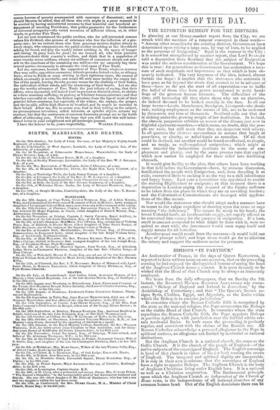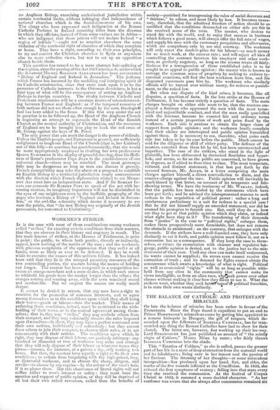BISHOPS "IN PARTIBUS."
AN Ambassador of France, in the days of Queen ELIZABETH, is reported to have written home on one occasion, that on the preceding evening he had enjoyed the distinguished honour of seeing the head of the Anglican Church dance a minuet. It is most devoutly to be wished that the Head of that Church may be always as innocently employed.
We learn from the daily newspapers, that on Sunday the 7th instant, the Reverend MICHEL SOLOMON ALEXANDER was conse- crated " Bishop of England and Ireland in Jerusalem," by the Archbishop of Canterbury ; and that " The Queen's licence as- signs Syria, Chaldea, Egypt, and Abyssinia, as the limits within which the Bishop is to exercise jurisdiction." In countries where the Roman Catholic faith is recognized by the state as the national religion, the Pope consecrates the Bishops as the visible Head of that Church. In countries where the state repudiates the Roman Catholic faith, the Pope appoints Bishops in yartibus infidelium, with jurisdiction over the faithful within cer- tain territorial limits. In both cases the proceeding is perfectly regular, and consistent with the claims of the Romish see. All Roman Catholics acknowledge a personal allegiance to the Pope in spiritual matters, an allegiance not limited by territorial or national distinctions.
But the Anglican Church is a national church, the same as the Gallic Church. It is the church of the people of England—of the native subjects of the sovereign of England. The English sovereign is head of that church in virtue of his (or her) wearing the crown of England. The temporal and spiritual dignity are inseparable. It is only in their own dominions that the sovereigns of England have a right to appoint Bishops. The Anglican Church is the body of Anglican Christians living under English laws. It is a national as well as a Christian corporation. The fundamental principle upon which the Anglican Church as independent of the Church of Rome rests, is the independence of all national churches of any common human head. Out of the English dominions there can be -no Anglican Bishop, exercising ecclesiastical jurisdiction within certain territorial limits, without infringing that independeuce of national churches which is the foundation-stone of his own. The clergy who have expressed such indignation at the Roman Catholic Prelates in Ireland assuming titles from the dioceses in which they officiate, instead of from some extinct see in Africa— who are indignant that those priests will not declare Ireland " a region of infidels "—ought not to sanction elsewhere the same violation of the territorial right of churches of which they complain at home. They have a right, according to their own principles, to try and convert the Christian churches in Syria or anywhere else to more orthodox views, but not to set up an opposition church beside them.
This question has ceased to be a mere abstract hair-splitting of theologians, since the passing of the Act 5 thV ictoria,c. 6 ; under which the Reverend Metter, SOLOMON ALEXANDER has been consecrated "Bishop of England and Ireland in Jerusalem." The jealousy which France has incurred by the meddling and intriguing spirit of its Catholic missionaries, since that state took upon it to be the protector of Catholic interests in the Ottoman dominions, is but a faint type of what will be the consequence of setting up Anglican Bishops in foreign countries. The rivalry between Catholic and Protestant missionaries will be a constant source of misunderstand- ing between France and England: as if the temporal concerns of both nations did not set them often enough by the ears, theologieM fuel has been added to the flame. If this first step under the act in question is to be followed up, the Head of the Anglican Church is beginning an attempt to supersede the Head of the Romish Church as the central authority of Christendom, and the resources of England are to be brought into play to back the red cross of St. George against the keys of St. Peter. The only power that can avert the danger is the power of ridicule. Unless the English people, and Europeans in general, are sufficiently enlightened to laugh our Head of the Church (that is, her Cabinet) out of this folly—to convince her good-humouredly, that she would be more appropriately employed in rivalling her own predecessor Queen ELIZABETH in the display of graceful dancing, than his Holi- ness of Rome's predecessor Pope Joax in the establishment of one universal church—there may be mischief. The most grotesque folly may be dangerous so long as men can discuss it gravely. French susceptibility may take the alarm at a proposal to establish an English Bishop to a territorial jurisdiction nearly conterminous with the districts which French diplomatists wished to see MEHE- MET Ara erect into an independent state. And if Sir ROBERT h.. Gras can persuade Sir ROBERT PEEL to speak of the act with be- coming unction, its imaginary importance will not be diminished in Ave eyes of our neighbours even by the ineffable geography of the sages who institute a Bishop of " England and Ireland in Jerusa- lem," or the owl-like solemnity which deems it necessary to as- sure the public, that "the new Bishop was originally of the Jewish persuasion, but converted to Christianity."



























 Previous page
Previous page